A peculiar trait of cruel regimes down the centuries has long been their obsession with image. The most brutal, authoritarian and unaccountable of states pay a level of attention that borderlines on the obsessional to not merely how they are viewed by their own citizenry, but also by other states and powerful actors on the international stage.
Nowhere is this truer than in the Islamic Republic of Iran, where untold amounts of public cash are funneled every year into pro-regime, external-facing institutions that aim to bolster the regime’s fraught image overseas and advance the ideological principles it claims as a source of legitimacy.
These pro-Iran outfits extend not merely to media outlets such as Islamic Republic of Iran Broadcasting and the ubiquitous PressTV, but to online disinformation networks, cultural institutions and Iran-sponsored local organizations that – wittingly or unwittingly – have become a proxy for the Islamic Republic in their communities.
IranWire’s new series of articles aims to lift the lid on how pro-Islamic Republic propaganda manifests in different countries around the world. In partnership with local journalists, we’ll shed light on local support bases for the Iranian regime, how their narratives are spread and gain currency, and the sometimes devastating impact this has had on local democracies.
Our first article focused on the inroads made by Hezbollah and the Islamic Republic of Iran in Argentina. The second looked at the media alliance between the Islamic Movement of Nigeria and the Iranian regime. The third examined how Iran inserted itself into the post-war landscape in Bosnia and Herzegovina. The fourth article explores how Iran’s spiritual and foreign policy is disseminated in London, UK.
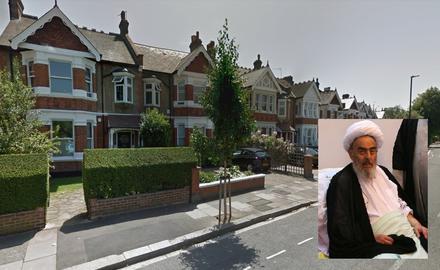
The residential street in London where the dream of Grand Ayatollah Mohammed Fazel Lankarani, right, to establish a Shia institution in Britain never came to pass
In the summer of 2007 one of Iran’s most respected Shia clerics, Grand Ayatollah Mohammed Fazel Lankarani, died at the age of 79. In his last will and testament, Lankarani declared: “I want an institution to be established in London, which is the gateway to the world and the second home of all countries… to spread the teachings of the Twelver Shiites.”
Lankarani’s dream of an Iran-backed religious mission in London never came to fruition. His executors did buy a property in the city – an unassuming £850,000 semi-detached house – and a UK limited company as a vehicle for the London branch of Qom’s Jurisprudence Center of Pure Imams. But they took no further action from there, and the business was struck off the register in 2014, having reported just £1 to £2 in its coffers every year since 2008.
The reason for this disinclination to follow the spirit of Lankarani’s will might well have been because, just a stone’s throw away in the British capital, other better-funded institutions had already entrenched themselves in the social and cultural life of the “gateway to the world”. Concentrated in Brent, north-west London, and Maida Vale in Westminster, are many groups and entities that espouse the tenets of Twelver Shia Islam, which is observed by more than 100,000 people in the UK. But in addition, some find in London – one of the most diverse cities in the world, and also one in which the socialist left have long aligned themselves with anti-capitalist, anti-imperialist causes – fertile ground to promote, intentionally or not, the cultural and foreign policies of the Iranian regime. The situation is complex, and the people involved are numerous; an abbreviated list of important figures is included at the end of this report.
On October 12 this year, Ayatollah Khamenei remote-delivered a sprawling speech to military academy graduates in which he revisited the notion of a so-called “cultural invasion” of Iran by the West. “When we talked about the cultural invasion,” he said, “the enemy lost his nerve and tried to resist the ‘fight against cultural invasion’ with its propaganda.” Naturally, the Supreme Leader was too bashful to name any of the cultural outposts that he specifically, not to mention the Iranian regime, have benefitted from over the years on what he has termed “enemy” soil. They are numerous across Europe, and London is no different.
A Tale of Emissaries
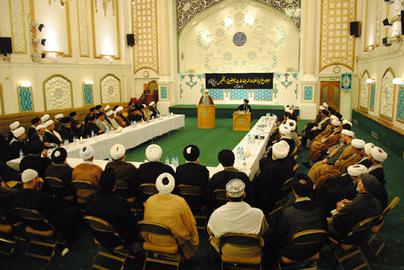
The Islamic Centre of England in London
In the early 1980s, Ayatollah Ruhollah Khomeini began sending trusted envoys and diplomats to different countries to work with allies and potential allies (and also to kill his enemies abroad). After his death in 1989, his successor, Ayatollah Ali Khamenei, expanded these foreign operations.
The Islamic Republic by now had dozens of diplomatic institutions around the world, most of which hosted a cultural attaché with an often generous budget for outreach work. There were also the Shia mosques abroad which, as per tradition, are financed and run by a Shia marja. Marjas are grand ayatollahs who interpret the teachings of Islam for their followers, and in Iran, the legitimacy of the Islamic regime depends on their approval. Marjas who support the Iranian government and the Supreme Leader, in addition to receiving funds from their followers, are in turn also funded by the regime.
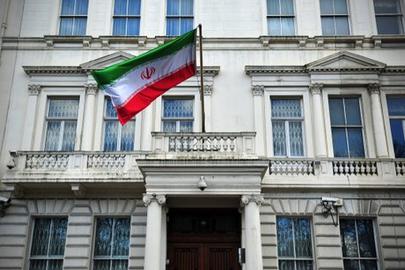
The Iranian embassy in London
Iran’s official representatives abroad have at times been too independent for Ayatollah Khamenei’s taste. Embassy cultural attachés, for instance, are chosen not by the Supreme Leader but by a department inside Iran’s Ministry of Culture and Islamic Guidance, called the Islamic Culture and Relations Organization (ICRO), which has historically been staffed by people of a more reformist bent than Ayatollah Khamenei’s hardline devotees.
So instead, Khamenei relied on the Islamic Propaganda Organization (which uses the euphemism “Islamic Development Organization” in its English material) to build a parallel cultural apparatus both inside the country and abroad. Institutions that form part of its legacy dot the map in Western Europe. Establishing any link between these places and the Supreme Leader, decades on, is not always an easy task, but a tell-tale sign is that they are run by a cleric or state official specifically tasked with being a representative of Khamenei. And so it is for some of the Supreme Leader’s publicists in London.
The Islamic Centre of England (est. 1998)
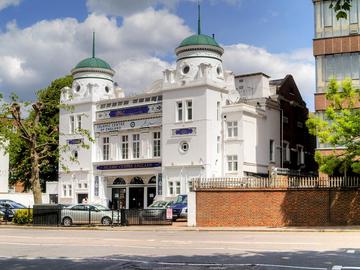
The Islamic Centre of England is based on the site of a former Mecca Bingo and dancehall in London's Maida Vale
The best-known of the Iranian government’s ideological strongholds in London is based in an ornate building in London’s Maida Vale High Street, whose two copper-domed towers rise above bustling shops and takeaways below. Emblazoned with Persian calligraphy and decorated with white and blue tiles, the building today bears no trace of its past: from 1913 to 1940, number 140 Maida Vale served as a music hall and luxurious cinema known as the Picture Palace, and then from the 1960s onward, as a branch of the popular if dubiously-named Mecca Bingo chain.
The freehold for the former gambling hall was bought by Iranian officials in 1997, at the then-staggering cost of £1.2million. The Islamic Centre of England was established by Ayatollah Mohsen Araki, Khamenei’s then-personal envoy to the UK, who had come to Britain in 1994 after years of difficulties in obtaining a visa.
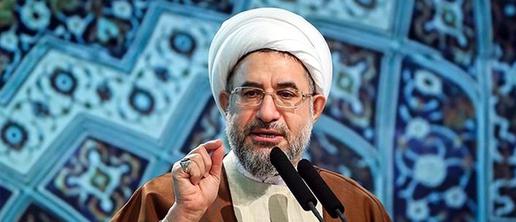
Ayatollah Mohsen Araki, Ayatollah Khamenei's then-representative in London, set up Islamic Centre of England Limited in 1995
Islamic Centre of England Limited (ICEL) had been registered in England in 1995. The company’s governing document requires that “at all times at least one of the trustees shall be a Representative of the Supreme Spiritual Leadership of the Islamic Republic of Iran.”
In the mid-2000s this position was taken up by Abdolhossein Moezi, a Tehran-born cleric who had previously served as Khamenei’s personal envoy in Austria and until 2004 presided over the Imam Ali Islamic Centre in Vienna. The current head of ICEL is Mohammad Ali Shomali, who formerly worked at the Imam Khomeini Education and Research Institute. The institute is run by Mohammad-Taghi Mesbah Yazidi, one of the most reactionary clerics in Iran. After the Islamic Centre’s Ashura celebrations in 2016, Shomali received a letter from the head of the International Relations Department of the Supreme Leader’s Office thanking him for his “selfless efforts and valuable work” as “the respected representative of His Excellency Grand Ayatollah Khamenei”.
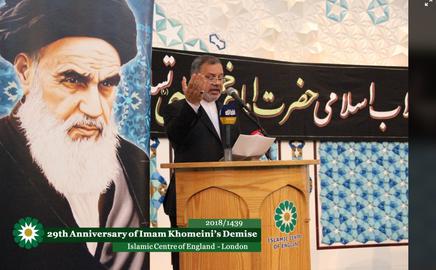
An annual ceremony commemorating Ayatollah Khomeini at ICEL
In 1997, ICEL’s first-ever accounts stated it made a surplus of just £35,900 that year – aside, of course, from the £1.2m “donated by the directors” to buy the building. Its last filed accounts show that by 2018 it had more than £4m in funds at its disposal.
The building in Maida Vale has become a hub for many in the London Muslim community. Open 365 days a year, it boasts a mosque, two halls for conferences, seminars and social gatherings, a library and a bookshop. Among the Islamic Centre’s stated aims are “to provide spiritual guidance for the Muslim community at large”, “to disseminate authentic knowledge about Islam” and “to provide non-Muslims with a better, clearer understanding of Islam”.
The website of the Islamic Centre says its members come “from wide and different backgrounds and ways of life”. But nowhere on its “About” page does it state that it is both owned and controlled by officials of the Islamic Republic of Iran. ICEL did not respond to repeated questions from IranWire as to why.
ICEL seems to be careful not to publish any incendiary material on its website, but during its events, it actively promotes Ayatollah Khamenei’s anti-Western and anti-Israeli speeches. In June this year ICEL was hit with an official warning by British regulator the Charity Commission. On January 3, 2020, this ostensibly spiritual organization had hosted a memorial at 140 Maida Vale for General Ghasem Soleimani, the commander of the Islamic Revolutionary Guards Corps’ Quds Force, who was killed by American forces in January 2020. ICEL held another event for the military chief the next day, posting condolences and praise for Soleimani on its website. It was found by the Commission to have committed a breach of trust and/or misconduct, with director of investigations Tim Hopkins warning: “We are concerned by the corrosive effect this might have on public confidence in this and other charities.”
Saied Reza Ameli: Iran’s Digital Tsar in London

Iranian official Saied Reza Ameli has aided in the establishment of several pro-Islamic Republic cultural institutions in London
One of the most important figures in Iran’s construction of ideological in-roads in London is Saied Reza Ameli: secretary since 2019 of Iran’s Supreme Council of the Cultural Revolution, former directly-appointed member of the Supreme Cyberspace Council from 2015, conservative editor-in-chief of the Iranian Journal of Cyberspace Studies, director of communications and Dean of the Faculty of World Studies the University of Tehran – and owner since 2003 of a £223,000 flat in a sought-after area of north London.
Back in 1993, Ameli helped establish the short-lived UK branch of the Tehran Times in London together with its then-managing director, Mohammad Soltanifar, who went on to serve as Iran’s deputy culture minister. Ameli also co-founded Islamic Centre of England Limited along with Ayatollah Mohsen Araki. Earlier this year, BBC Persian revealed that between 1999 and 2001, Ameli also co-directed two further British companies with Ardeshir Fathinejad, the former Chief of Staff of the Ministry of Petroleum, called Eram Limited and Pars Cultural Group Limited. The purpose of these now-defunct companies is still unclear.
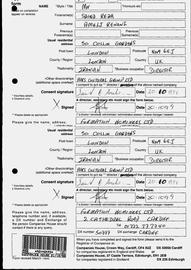
Saied Reza Ameli co-established two UK businesses with Ardeshir Fathinejad, former head of the Ministry of Petroleum
Despite this array of demands on his time, Saied Reza Ameli has since 2006 shouldered one additional duty: as co-director of a controversial London-based campaign group called the “Islamic Human Rights Commission” (IHRC). Ameli has continued to play an active role at IHRC despite now being a senior Iranian state official.
The Islamic Human Rights Commission (est. 1997)
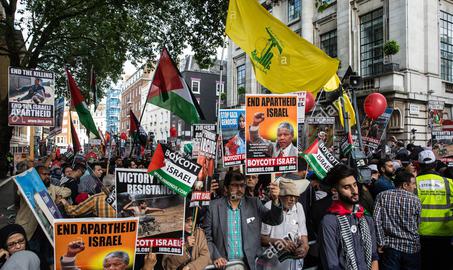
The IHRC organizes the annual Quds Day parade in London, where tensions have repeatedly flared up and some attendees have carried Hezbollah flags
The Islamic Human Rights Commission is an NGO based in Wembley, west London. Since 2007 it has held special consultative status with the United Nations. The charity says its mission – and the basis on which it receives tax relief in Britain – is: “To promote human rights and equality and diversity (in particular good race relations) throughout the world for the benefit of the public”.
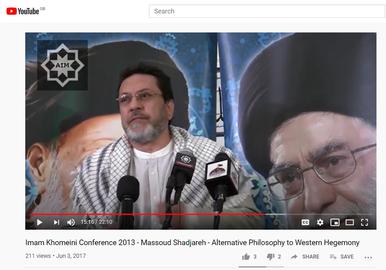
Co-founder Massoud Shajradeh is a supporter of the principles espoused by Ayatollah Khomeini
Chaired by the Iranian-born Massoud Shajradeh, in addition to its campaigns on issues such as Palestinian self-determination and Guantanamo detainees, the IHRC has consistently promoted a pro-Khomeneist and Hezbollah-apologist narrative. Its 2006 “Charter for Muslim Unity” was co-authored by Mohammad al-Asl, a Washington-based preacher who publicly swore allegiance to Ali Khamenei in 1994 and who, like Khamenei, has downplayed the number of Jews killed in the Holocaust and called for the “liquidation” of Israelis. The IHRC’s chairman Massoud Shajradeh, meanwhile, has feigned ignorance of human rights abuses in Iran, telling a reporter who asked about the Green Movement’s demands in 2011: “I don’t know what you’re talking about”. Shajradeh has spoken in praise of Khomenei at public events, stressing, as Khomenei did, the need to oppose Taghut – a term used by the Iranian government to refer to the West and its allies. Resistance can include shunning the authority of non-Islamic courts.
In London the IHRC organizes the annual Quds Day demonstrations, where Hezbollah flags have been a feature, as well as clashes between IHRC members and London counter-demonstrators. IHRC activist Raza Kazim was involved in a fiery altercation with London’s Metropolitan Police on Quds Day in 2011, in which he screamed that officers were “encouraging” Iranian counter-demonstrators. In 2017, IHRC director Nazim Ali was subject to a private prosecution, which failed, over a series of statements he made at the rally including blaming the Grenfell Tower tragedy, a devastating fire in a London residential tower block that killed 72 people, on “Zionists”. The IHRC has also claimed the UK’s designation of Hezbollah as a terrorist group was “a capitulation to right wing thuggery and minority Zionist voices”, with Shajradeh further claiming it was “the result of two years of Zionist campaigning”.
In its 23 years of operation the IHRC has denounced more than 50 countries for mistreating Muslims. But despite calling for the Met Police to arrest anti-Islamic Republic of Iran opposition groups, the IHRC has never taken up the cause of any victims of human rights abuses in Iran. The IHRC enjoys a cosy relationship with Iran’s state-controlled PressTV, whose former head of news Roshan Muhammed Salih has spoken at several IHRC events, while Shajradeh and other members of IHRC have been given a platform by PressTV in exchange.
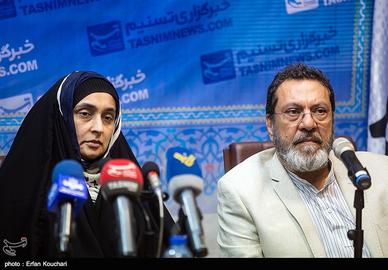
Co-founder Arzu Merali, left, has received an Iranian state-sponsored human rights award
In 2016, another IHRC co-founder, Arzu Merali, received a human rights “award” from the Iranian government at a Tehran ceremony presided over by then-judiciary head Ayatollah Sadegh Larijani. At a 2017 event called “Strike the Empire Back”, she said: “We know who the enemy is. It’s the West, it’s the NATO countries, it’s the white supremacist structure or the liberal structure or whatever you want to call it, despite its protestations of being neutral.”
When asked by IranWire whether it received any funding from the Islamic Republic, and about the extent of Saied Reza Ameli’s control of the scope and direction of its projects, the IHRC said IranWire’s questions were Islamophobic and that IranWire is “happily helping to perpetuate the systemic injustices that permeate the society we live in”. It insisted it had no link with any government, officially or unofficially. IranWire also asked about the dearth of coverage of human rights abuses in Iran on IHRC’s website. The IHRC did not address this but invited us to “revert to us if you have any serious questions” about human rights.
In February this year the Islamic Human Rights Commission lodged a complaint against British newspaper The Times, claiming it had published “misleading” content by stating it had “links to Iran” and by quoting an activist who said: “Tehran uses this group to spin its propaganda”. The Independent Press Standards Organization dismissed the complaint, finding The Times’ coverage was accurate.
The Islamic College (est. 1996)
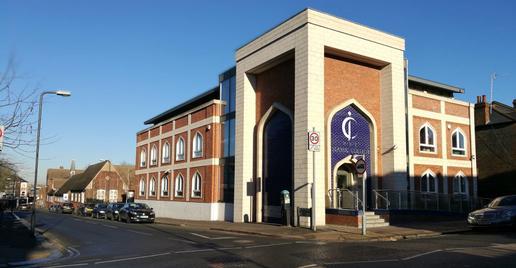
The Islamic College was established by Mohsen Araki in 1996
The Islamic College is an educational institution based in Willesden, northwest London. It was established in 1996 along with its fundraising arm, the Irshad Trust, by Khamenei’s then-representative Ayatollah Mohsen Araki. In its first year of operation, the Irshad Trust received “gifts” of £1,367,439. Araki’s successor Abdolhossein Moezi has also since served as a trustee.
The college offers undergraduate and postgraduate courses in Islamic studies, validated by London’s Middlesex University. It also has an attached Shia seminary, the Hawza Ilmiyya of England, and receives upwards of £1million a year in donations. It aims, it says, to “promote a new approach to the study of Islam and Muslims” and is currently meeting all the standards for higher education provision in the UK.
Khamenei’s book on Islamic thought is on sale at the college’s bookshop. The Islamic College’s first director was Mohammad Jafar Elmi, deputy director of education of the Al-Mustafa International University in Qom, the Iranian government’s main seminary to train non-Iranian students. Al-Mustafa’s website describes the London college as one of its “international branches and affiliate schools” – though no such allegiance is declared on The Islamic College’s own webpages, a matter the college would not comment on when approached by IranWire. The property the college occupies at 133 High Road, held since 1998, is part-owned by the Supreme Leader’s digital tsar Saied Reza Ameli alongside members of the Irshad Trust. The college did not comment on why this was the case.
In 2006 a controversy arose after students complained The Islamic College was teaching an introductory module on Islamic law based on a 13th Century text which described non-Muslims as “filth” and likened them to pigs and dogs. Its teacher said the idea was not to teach Islamic jurisprudence through this material, but to familiarise students with classical texts.
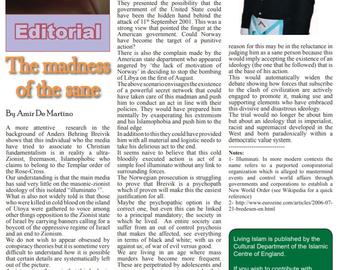
College teacher Amir de Martino wrote in ICEL's monthly mazagine that the US government may have been the "hidden hand" behind 9/11
The college’s current Program Leader for BA Islamic Studies is a former student, the Italian-born Amir de Martino, who is also editor of the ICEL’s monthly magazine Living Islam. In June 2012, the British-Jewish charity Community Security Trust raised the alarm over a May 2012 editorial in the magazine, in which de Martino promoted a conspiracy theory that the far-right terrorist Andreas Breivik, who had killed 77 people in Norway in 2011, was “in reality an ultra-Zionist, freemason, Islamophobic” whose true inclinations were covered up by the media. Breivik, he said, might have “taken action on the words of the leader of the White House” because “[Norway] presented the possibility that the government of the United State (sic) could have been the hidden hand behind the attack of 11th September 2001.”
The School of the Islamic Republic of Iran (est. 1997)
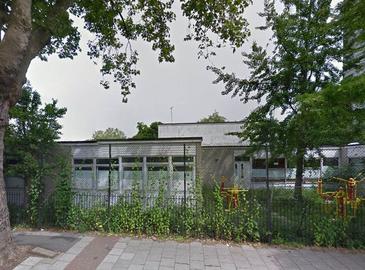
This school in northwest London was formerly a Church of England primary. The building at 100 Carlton Vale was bought by the Iranian Embassy in 1997 and reopened its doors under a new name in 2007. From 2013 the Iranian Ministry of Education was listed as the proprietor, followed by a man named Seyed Abbas Hosseini from 2018.
The school teaches the Iranian national curriculum, in Persian, to mostly Iranian and British-Iranian children. In 2010, inspectors from the British schools regulator Ofsted noted: “Many of the pupils will return to Iran to complete their education, which is one of the school’s aims.”
However, the number of pupils on roll has swelled to 132, aged from six to 16, even though its official capacity is just 81. For a whole decade now the school has fallen foul of British educational standards, with the most recent Ofsted report again rating it “Inadequate”. Safeguarding measures were not being taken, inspectors said, and pupils were behind in reading and the sciences. The previous November the British Department for Education also slapped the school with a warning notice for “serious regulatory failings” and ordered it to carry out criminal record checks on every member of staff it had employed since 2007.
There is very little publicly-available information about the School of the Islamic Republic of Iran or its teaching practices. It does not have a website, which is practically unheard-of for an English school, and the identities of the board of governors have not been published.
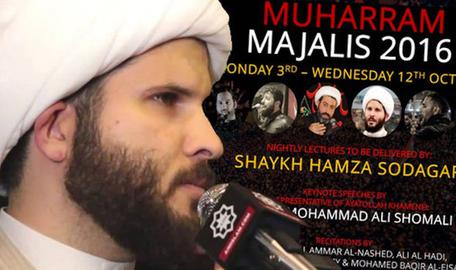
The controversial Shia cleric Shaykh Hamza Sodagar was invited to give a series of talks at the school in 2016
In October 2016, the school played host to a lecture series from the American Shia cleric Shaykh Hamza Sodagar, a vocal supporter of the Islamic Republic. The former Qom seminary student, who has also spoken at ICEL, had in the past published a 30-minute biography of Khamenei to prove that he was “no doubt, one of the most just scholars” and the best-qualified person to lead the Islamic Republic of Iran. Shaykh Sodagar has also variously suggested, Khamenei-style, that 9/11 was “an Israeli project”, and claimed that Americans and Europeans are puppets of Jewish lobby groups and “a Zionist web of media is trying to control the minds of people”. He was filmed in 2010 describing five ways gay men could be killed in Islamic law.
The Ahlulbayt Islamic Mission (est. 2003)
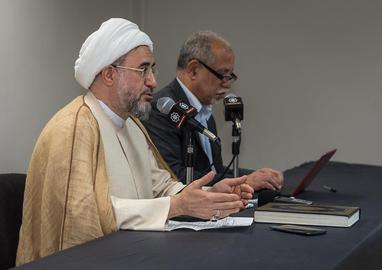
Mohsen Araki gives a speech at an event hosted by the Ahlulbayt Islamic Mission in August 2018
In the British media uproar over Shaykh Sodagar’s visit, the organization that invited him to London spoke out in his defense. The Ahlulbayt Islamic Mission (AIM), a London-based nonprofit, insisted Sodagar’s proscription for the treatment of gay men was “a clear and undeniable position that is upheld by Islam as found in Islamic scripture and tradition” and could not be practiced outside of Islamic countries.
AIM is an Islamic organization that seeks to further Twelver Shia Islam and, according to its website, “bring about a social movement to hasten the return of the Awaited Saviour, Imam al-Mahdi” by empowering English-speaking Muslim communities and furthering “values of dignity, honour, justice and human rights for all people around the world”. The campaign group has no direct relationship with the Islamic Republic of Iran – though its sole director, Samir Haidari, also briefly ran a different company based at ICEL’s address called the “Ahlul Bayt Assembly of UK and Republic of Ireland”, having taken over from the Supreme Leader’s envoy Abdolhossein Moezi in 2016. There is no record of what activities this organization carried out, and AIM says the two groups have nothing to do with each other.
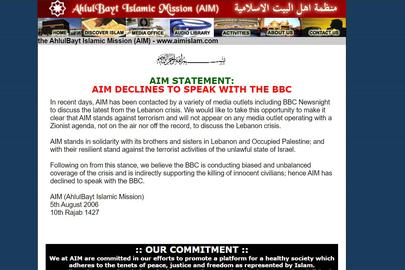
AIM declares it will not engage with the "Zionist" British Broadcasting Corporation in 2006
Because of its spiritual affiliation to Iran’s leadership, since its inception in 2003 AIM has promoted the teachings of Ayatollah Ali Khamenei, the current supreme leader of Iran, on its website and hosted seminars with prominent regime officials, including Ayatollah Araki, the leader’s representative. It hosts an annual Khomeini remembrance event at ICEL and Samir Haidari, described as a UK activist, has been interviewed for the official website of Ayatollah Khomenei.
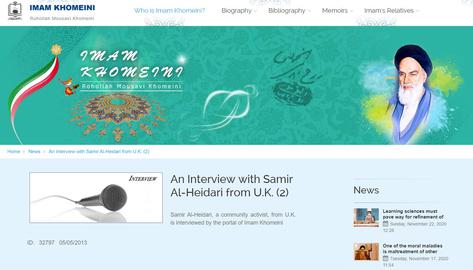
AIM founder Samir Haidari is featured on the official website of Imam Khomeini
But in addition, AIM has published English-language content mirroring the Iranian regime’s foreign policy and narratives on the US, the West and Israel. These include an article on “Why the US isn’t to be trusted”, a public statement on its refusal to discuss the 2006 Lebanon war with the “Zionist” BBC, and pronouncements by Araki on the “corruption” of the United States in the wake of the killing of George Floyd, as well as an article by a Tehran University professor excoriating the “deficit of dignity” of such countries as Japan and South Korea compared to the praiseworthy “culture of resistance” fostered by Khamenei.
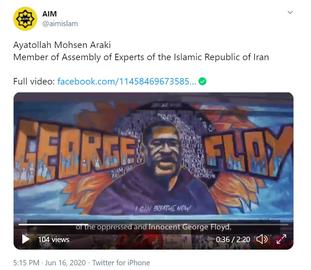
Earlier this year AIM shared a video in which Ayatollah Araki reacted to the death of George Floyd, saying the US "has deprived the whole world from breathing"
AIM has decried ill-treatment of Muslims in Saudi Arabia, the US and Nigeria, and of Uighurs in China and Chechens in Russia, but has yet to touch on state-sponsored violence against Muslims, including Shia clerics, in Iran. Haidari has written of AIM’s having been “targeted” in the past in these terms: “We stand against the many attempts to secularise Muslims in the West. Our natural position has always been and will always remain that of love and respect for other organisations and centres, including the Islamic Centre of England, the Office of Ayatollah Khamenei, which we consider our innate home.”
***
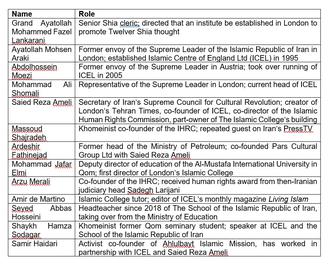
Read other articles in this series:
visit the accountability section
In this section of Iran Wire, you can contact the officials and launch your campaign for various problems




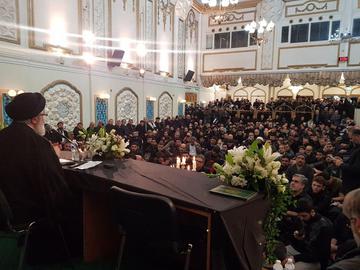
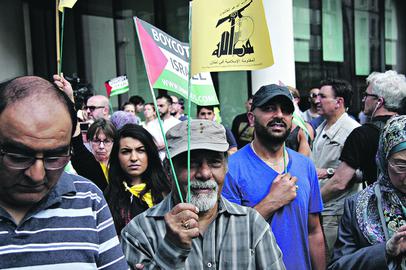

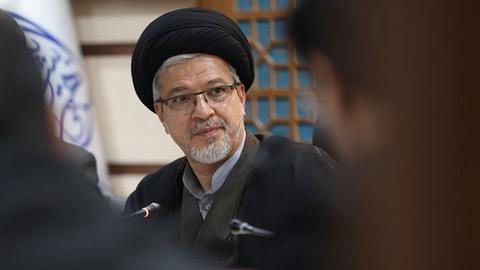
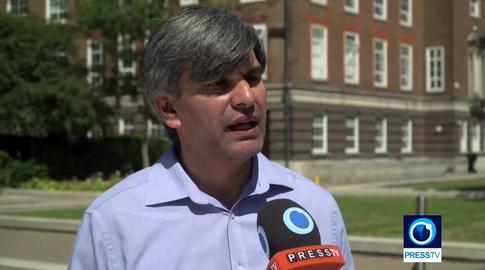
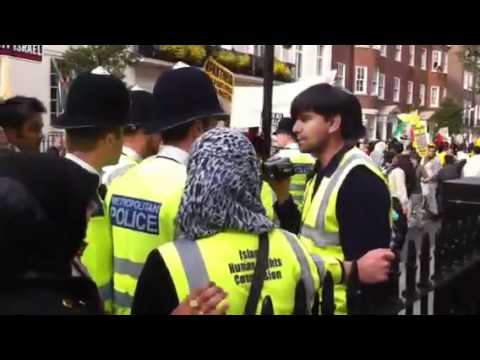



















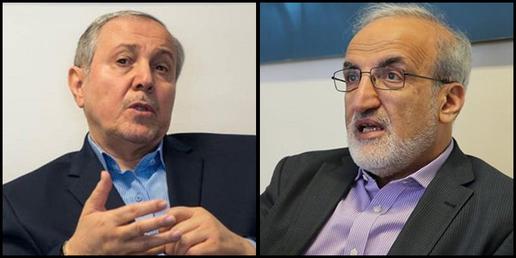
comments